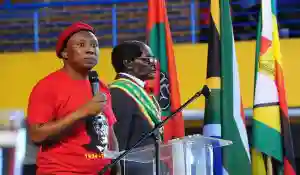Julius Malema, the leader of the Economic Freedom Fighters (EFF) has expressed shock upon learning of Jacob Ngarivhume‘s imprisonment in Zimbabwe.
Ngarivhume, the leader of the opposition Transform Zimbabwe party, was last month convicted of incitement to public violence and sentenced to four years in jail for a tweet he posted in July 2020. In the tweet, Ngarivhume called for a national shutdown to protest against poor leadership by the ZANU PF-led government.
In a Twitter post seen by Pindula News, Malema said Zimbabweans must learn to protect their people especially those fighting corruption. He said:
I was shocked to hear that a Zimbabwean Government has jailed Jacob Ngarivhume @NgarivhumeJacob, for demanding accountability through picket lines on how Covid-19 funds were used in 2020 by kleptocratic politicians. Sending an activist to 4 years imprisonment for simply holding different political views is pathetic. Zimbabweans must learn to protect their own, particularly those who are the voice of the voiceless against the corrupt few. The truth will never be incarcerated; Africa we are one.
Malema’s remarks come after Jonathan Moyo, a former Information Minister now in exile, claimed that Jacob Ngarivhume‘s conviction and imprisonment signifies a regression of Zimbabwe’s judiciary system back to the Gukurahundi era. The Gukurahundi era was a period of political violence from 1983 to 1987. The Zimbabwean military killed an estimated 10 000 to 20 000 people, mostly ethnic Ndebele, under the pretext of suppressing a rebellion by armed dissidents and due to political tensions between ZANU-PF and PF-ZAPU parties.
Both Zimbabwe and South Africa have constitutional guarantees of political freedoms such as freedom of expression, assembly, and association. However, Zimbabwe has been criticised for restricting these freedoms through arrests and harassment of opposition figures, journalists, and activists, while South Africa has a more open political space but faces concerns of political interference and corruption. The actual practice and implementation of political freedoms can differ based on the government’s approach to dissent and opposition.

